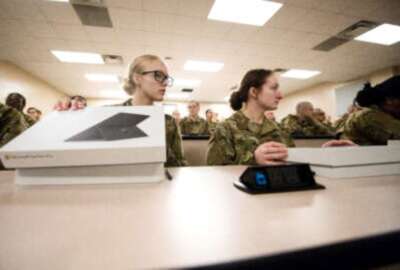The Army moves to make spouses financial lives more viable
Service members are often part of two-income families. But spouses face continued difficulty of establishing themselves when the service member gets relocated.
Service members are often part of two-income families. But spouses face the continual difficulty of establishing themselves when the service member gets relocated. Now the Army has schootched up its reimbursement policy for those spouses to, in the Army’s words, promote career continuity and military readiness. Joining the Federal Drive with Tom Temin with details, Army program analyst Steve Yearwood.
Interview Transcript:
Tom Temin Well, what’s going on here, you are reimbursing spouses. But there’s more to it than simply reimbursement. There’s also other enhancements to help them with licensing and so on, as they move from place to place.
Steve Yearwood That’s correct. This policy change means quite a bit to military spouses. It allows military spouses to have their professional licenses and business costs reimbursed, which makes it easier for them to continue work in their chosen field or profession as a result of these frequently move, but more importantly, it promotes career continuity, financial stability, and professional fulfillment.
Tom Temin When someone moves, what has been the policy, say they have a license for Real Estate license, or it could be a cosmetician type of license. We’re talking generally state licensing fees, that kind of that type of thing.
Steve Yearwood Yes, we’re talking state licensing fees. So for example, a military spouse, maybe a lawyer or dentist and have to get a license renewed recertified, when they move to another state, whatever fee they’re paid, the Army will reimburse them up to $1,000, for that recertification of that license.
Tom Temin And was there no reimbursement before this? Or did the reimbursement that was there get raised.
Steve Yearwood So in the FY 18, National Defense Authorization Act, that’s when the policy what the law should say, came out that reimburse spouses for $500. Then the following year, subsequently, it was increased to $1,000. And that stayed pretty much static until the FY 2003 NDAA when they added business costs to the existing law. So this policy included both those changes for licensure reimbursement, and also business costs.
Tom Temin So in other words, an individual could get as much as 2000 in a relocation 1000 for the license and up to 1000 for whatever costs are incurred.
Steve Yearwood That’s correct. That’s correct. And that’s the benefit of this policy to help streamline the process. What are these military spouses, so they understand the benefit that they will receive as a result of these frequent moves?
Tom Temin Do we have any sense of how often this happens in a year? I mean, relocations are 10s of 1000s. How many people do we know apply each year for reimbursement or relicensing fees?
Steve Yearwood Right, the data that we do have and we’ve been tracking this initiative since the inception. So going back to 2019, when we published our policy as a result of the NDAA in 18. So since that inception, we have reimbursed military spouses just for licenses. reimbursement, I will say in excess of 750 spouses have filed for claims.
Tom Temin So it’s not a vast number, but I guess it really matters to those that do file for claims.
Steve Yearwood Yes, it doesn’t matter because again, this reimbursement is taxable. So it becomes, you know, tax. So for example, if a military spouse file for reimbursement of $500, reimbursement that $500 will be taxed, and the soldier is the one who’s filing on behalf of their military spouse.
Tom Temin All right, good to know, we’re speaking with Steve Yearwood. He’s an Army program analyst in the Directorate of prevention, resilience and readiness. And just a question on licensing. State license fees probably vary widely. And I imagine within a given number of professions, you mentioned dentists, for example, I imagine that’s a much higher licensing fee than say someone that wants to do manicures, do you have that sense of what each state costs for various things.
Steve Yearwood I don’t have what each state costs. However, we do have resources that kind of leads spouses through the different resources. So if they’re getting ready to move to a new state, they can actually go and see what those requirements are, because although there’s a reimbursement fee, there may be some other requirements that may preclude them from obtaining that license and affecting the reimbursement fees. But again, those fees can be reimbursed even for a recertification, whatever the cost is, as long as doesn’t exceed the $1000. So to your point, yes. We have several military spouses file in excess of 2000 in some professions, but again, the reimbursement is the max is up to $1,000. And again, that $1,000 being taxed.
Tom Temin And are you aware of any states for example, that maybe give a little extra boost Maybe if what the person is bringing to the state doesn’t have an exact match with the requirements, they’ll nevertheless grant it because the person is part of the military permanent change of station. Do the states ever give a little bit of leniency to military member spouses?
Steve Yearwood Yes. And one of the key points I want to make here to this question is that we the army, works with the defense State Liaison Office, whose primary function is to work with state legislators to help military spouses in regards to licenses and recognizing their licenses, expediting the process, limiting the number of paperwork. So that’s what we do within the Army to work with the state liaison office to help guide that effort. And that’s a continuous effort that the Defense State Liaison Office does. But identifying specifically what state requires or what they’re doing. I don’t we don’t have that information readily available. But it’s something that we can definitely, you know, provide at a later time if necessary.
Tom Temin Yeah, you’ve got the career onestop site that kind of guides them to that information, I guess.
Steve Yearwood yes, we do have a page on our website, or quality of life webpage, specifically for Spouse Employment. And on that landing page, there spouses can see the resources and information on the process for filing a claim, subsequently, the policy is there. And they can also review the policy. But again, any questions they have, they are directed to go to their installation, employment readiness office, most installations, have one of those offices and those individuals will be able to help and guide those spouses and navigate them through this process, as well.
Tom Temin And we’ve been talking about an army program, do you have any collaboration or information sharing, say, with the Navy and the Air Force that probably have similar issues?
Steve Yearwood Yes. So I collaborate quite a bit with my service counterparts. And one of the things we did in regards to the policy, we actually did some collaboration to see how each service is primarily interpreting the law. So what we found is that I’m not going to speak because of the Navy and the Air Force is the ones that we was engaged with quite a bit. Their policy was similar to what our policies were. So we all were consistent in our messaging, and interpretation, where we do collaborate quite often with our services when it comes to the license reimbursement or business costs.
Tom Temin And before we let you go, I just wanted to ask you to comment on something the Army said in the statement, and that this is not just about income, but also professional fulfillment, talent, retention, and support of military readiness, in the grand sense.
Steve Yearwood Yes, so army spouses, as we know supports the soldier, which is essential to ensuring their soldier success and continuous service. And in return, you know, the Army is committed to helping these military spouses achieve their goals. And this is a benefit part of the Army’s ongoing effort to improve the quality of life, you know, financial stability and Army families. But last point is that when we talked about retention is also a key factor and a multiplier when we talked about ensuring the spouses continue their job, when they move from one location to another and not creating a financial gap I should state when it comes to PCS move. So in summary, this policy enhances that ability for the continuity of spouses promoting their careers. It also provided, like I mentioned earlier on professional fulfillment.
Copyright © 2024 Federal News Network. All rights reserved. This website is not intended for users located within the European Economic Area.
Tom Temin is host of the Federal Drive and has been providing insight on federal technology and management issues for more than 30 years.
Follow @tteminWFED






